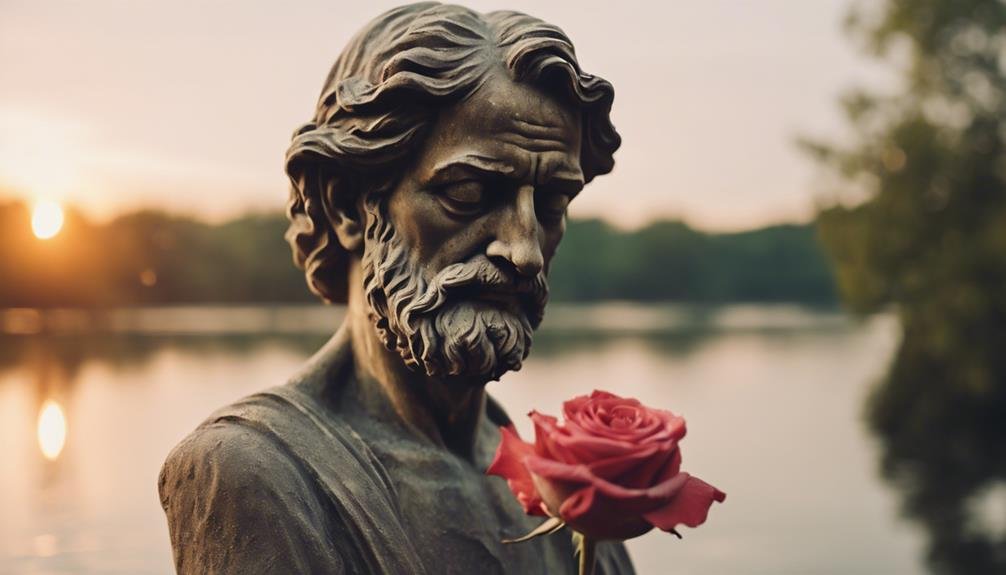When you think about the quotes on sacrificing love, you're tapping into a universal truth about human relationships. These quotes often reveal how deep your willingness to put someone else's happiness above your own can resonate within your soul. It's a poignant reminder of the power and pain intertwined in love's greatest sacrifices. Reflect on this: how often have you set aside your dreams, your comfort, or even your wellbeing for someone you love? And what does that say about the nature of love itself? As you consider these questions, you might find a new perspective on your own experiences of love and sacrifice.
Key Takeaways
- Quotes on sacrificing love often highlight the depth of affection and the pain intertwined with selfless acts.
- They reflect on the bittersweet nature of putting someone else's needs above personal desires.
- Literary examples, such as those from "A Tale of Two Cities," depict characters making ultimate sacrifices for love.
- Philosophical perspectives in the quotes may discuss how love and sacrifice contribute to personal growth and deeper relationships.
- Cultural interpretations in quotes can vary, showing the universal yet diverse views on the significance of sacrificing for love.
The Essence of Love's Sacrifice

At its core, love's sacrifice involves putting another's needs above your own desires. When you truly love someone, you often find yourself making decisions that prioritize their happiness, even if it means compromising your own. It's not about losing yourself; rather, it's about enriching your relationship by fostering an environment of mutual care and respect.
Imagine you're planning your weekend. You might want to go hiking, but your partner's been stressed and prefers a quiet day at home. Choosing to stay in with them, perhaps watching their favorite movies, is a simple yet profound act of love. It shows you value their well-being as much as, if not more than, your own interests.
This doesn't mean you should always sacrifice your needs for others. Love's sacrifice is also about balance. It requires understanding when to step back and nurture your own well-being too. Healthy relationships thrive on this give-and-take dynamic.
Embracing this concept can deepen your connections. You'll find that true joy often comes not from selfish pursuits but from the happiness you ignite in others. It's a powerful reminder that love, in its truest form, is generously selfless yet equally rewarding.
Historical Perspectives on Sacrifice
Throughout history, societies have revered sacrifice as a noble act, often viewing it as essential for the greater good or spiritual fulfillment. You can see this in ancient rituals where leaders would sacrifice treasures, or even their own comfort, to appease gods and secure prosperity for their people. This wasn't just about material or personal loss; it was a profound statement of devotion and responsibility toward the collective well-being.
In medieval times, you'd find that knights often sacrificed their desires, and sometimes their lives, for the sake of honor and feudal loyalty. They weren't just protecting territory; they were embodying the values of courage and sacrifice that were expected of them. Their actions spoke to a societal belief that personal gains should often be set aside for higher ideals.
Moving into more modern contexts, you've likely heard stories of individuals foregoing personal happiness for family duties or national service. These decisions were, and still are, celebrated as examples of putting the community or familial needs above one's own desires.
These historical examples all tie back to a central idea: sacrifice in love is timeless and varies in form but consistently aims at something beyond the individual's immediate satisfaction. It teaches you that true love often involves giving up a part of yourself for something greater.
Literary Reflections

Literature offers countless examples where characters must sacrifice their personal desires for love, illuminating the complex dynamics of human relationships. Take, for instance, the tragic tale of Jay Gatsby in F. Scott Fitzgerald's 'The Great Gatsby.' You see Gatsby's relentless pursuit to reshape his life for Daisy Buchanan, a love interest who ultimately doesn't reciprocate his monumental sacrifice. His longing leads to his downfall, showing you just how destructive and consuming such sacrifices can be.
In a different vein, consider Severus Snape from J.K. Rowling's 'Harry Potter' series. His undying love for Lily Potter drives him to protect her son, Harry, at all costs. This isn't a tale of romantic love fulfilled, but rather one of unspoken sacrifice. Snape's actions aren't for personal gain but stem from a deep-seated devotion that lasts even beyond Lily's death.
Lastly, imagine the choices made by Sydney Carton in Charles Dickens' 'A Tale of Two Cities.' He sacrifices his life so that Lucie Manette and her family can live happily. 'It is a far, far better thing that I do, than I've ever done…' he reflects, teaching you the profound impact of self-sacrifice for the greater good of those loved.
Cultural Interpretations
Exploring how different cultures perceive the notion of sacrificing love can offer you fresh insights into universal themes of devotion and loss. Across the globe, diverse traditions and histories shape how people value and interpret love's sacrifices.
In many cultures, sacrificing for love isn't just personal but deeply entwined with family honor and social expectations. You'll find that:
- In Japan, the concept of *giri* (duty) often requires individuals to put societal and family obligations over personal affection, leading to poignant stories of unrequited love.
- In India, the legendary tales of star-crossed lovers like Laila and Majnu emphasize the torment of love that can't transcend societal barriers, invoking a sense of tragic heroism.
- In Ancient Greek literature, characters often forsake personal happiness for the greater good, a reflection of the society's emphasis on duty to the state and the gods.
- In Middle Eastern cultures, poetry and music frequently explore the pain of separation and sacrifice, resonating with the soul's deep yearning for a union that earthly circumstances deny.
Each narrative and tradition you encounter weaves a rich tapestry of emotions, showing you that the heart's trials are both deeply personal and universally understood. As you immerse yourself in these stories, you're not just learning about love's sacrifices; you're experiencing the collective heartbeat of humanity.
Philosophical Insights

While delving into the philosophical aspects of sacrificing love, you'll uncover a myriad of perspectives that challenge and enlighten your understanding of devotion. Philosophers have long debated whether true love inherently involves sacrifice or if such acts distort the purity of loving unconditionally. You might find yourself questioning whether sacrificing your desires for another's happiness is a noble act of selflessness or a denial of your own worth.
Consider Socrates' view on love, which suggests that love isn't merely an emotion but a motivational state that compels us to improve and seek the good. In this light, sacrificing might be seen not as losing but as gaining a deeper, more philosophical understanding of love. It's about the transformation of the self as much as it's about the care for another.
Aristotle takes this further by introducing the concept of ‘philia', or deep friendship, as part of love. He argues that true love can't exist without goodness and mutual benefit. Here, sacrifice is essential not because it's a forfeiture, but because it's a shared act that strengthens the bond.
As you reflect on these ideas, you'll see that sacrificing in love isn't just about giving something up; it's about what you gain in depth, connection, and personal growth.
Psychological Aspects
Turning to the psychological aspects of sacrificing love, you'll discover how these sacrifices impact our mental and emotional states. It's a thorough exploration into the heart's resilience and the mind's adaptability. When you sacrifice love, whether for personal growth, career advancement, or family obligations, you're testing your emotional boundaries and psychological endurance.
Here are several ways these sacrifices touch your emotional world:
- Grief and Loss: You might experience a profound sense of loss, akin to mourning. It's not just about missing someone, but also grieving the future you'd envisioned together.
- Growth and Insight: Over time, you gain insights into your emotional needs and desires. This can be a period of significant personal growth, where you learn about your strength and resilience.
- Anxiety and Uncertainty: The decision to let go often brings anxiety. You're stepping into the unknown, and the lack of certainty can be unsettling.
- Hope and Recovery: Eventually, hope surfaces. You start to see potential for new relationships and experiences that align more closely with your current life path and values.
Understanding these aspects can help you navigate your feelings more effectively, ensuring you don't feel alone in your journey.
Personal Stories of Sacrifice

Delving into personal stories of sacrifice, you'll find poignant examples of individuals who've made heart-wrenching decisions in the name of love. Imagine yourself in the shoes of Sarah, who moved across the country to support her partner's dream job, leaving behind her family and a promising career. Her sacrifice laid the foundation for a partnership that values mutual growth and support, showcasing love's power to transcend personal ambitions.
Then there's Michael, who gave up his chance to study abroad so he could care for his ailing parent, demonstrating that love isn't only about romantic gestures but also familial devotion. His story teaches you about the deep bonds that can be formed when you put others' needs before your own desires.
Consider Jane, who ended a long-term relationship because she knew her significant other had a better opportunity overseas. It was a tough call, but her selflessness allowed both of them to pursue paths that were true to their individual aspirations.
These stories aren't just narratives; they're reflections of the hard choices people make every day. You're compelled to look beyond the surface and appreciate the profound impact of these sacrifices, recognizing that such acts of love are both remarkable and inspiring.
The Pain and Beauty
Sacrificing for love embodies a profound blend of pain and beauty, deeply touching the core of our human experience. You know it's not just about the tears and the heartache, but also about the pure, unselfish love that fuels those sacrifices. It's a paradox that tugs at your heartstrings, compelling you to give up something precious for the sake of someone else's happiness or well-being.
Consider how these elements make you feel:
- Loss of Personal Desires: The aching emptiness you feel when putting aside your dreams.
- Depth of Affection: The overwhelming love that pushes you to make such sacrifices.
- Bittersweet Outcomes: The mixed emotions when seeing your loved one thrive, knowing you've played a part, albeit at a personal cost.
- Enduring Emotional Scars: The lasting marks that remind you of what you've given up and why.
These sacrifices carve deep emotional grooves into our lives, shaping who we're and our relationships. They teach us about the depth of our emotions and the strength of our commitments. It's a complex tapestry of feelings, but remember, every stitch contributes to the intricate beauty of your life's story.
Moving Forward After Sacrifice

After embracing the pain and beauty of sacrifice, you now face the challenge of moving forward and rebuilding your life. It's not just about surviving; it's about thriving beyond the choices you've made out of love. You'll discover new passions, meet new people, and perhaps even reimagine your life's goals.
You're not alone in this journey. Below is a table of actions and their benefits that can guide you through this process:
| Action | Benefit |
|---|---|
| Embracing New Hobbies | Fosters personal growth and joy |
| Seeking Supportive Friends | Builds a network of understanding and support |
| Setting New Goals | Provides direction and a sense of purpose |
It's essential for you to embrace these actions with open arms. New hobbies will not only occupy your mind but also expand your horizons, offering you a fresh perspective on life. Surrounding yourself with supportive friends who understand your journey can provide comfort and encouragement when you need it most. Lastly, setting new goals gives you a roadmap for your future—something to work toward. As you implement these steps, you'll find that moving forward isn't just about letting go, but also about stepping into a new chapter of your life with hope and resilience.
Conclusion
You've seen how sacrificing love spans history, literature, and cultures, weaving a complex tapestry of selflessness and strength. Remember, your sacrifices in love aren't just acts of loss; they're profound gifts that deepen connections.
As you move forward, carry the beauty and pain of these stories with you, letting them guide and inspire your relationships. Embrace the transformative power of love's sacrifices—it's not about losing, it's about giving in the most meaningful way.
